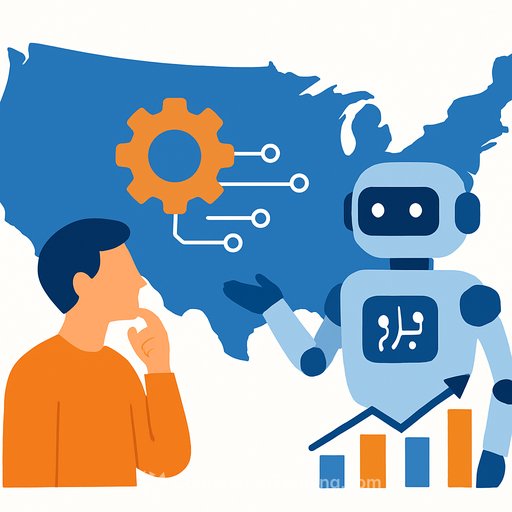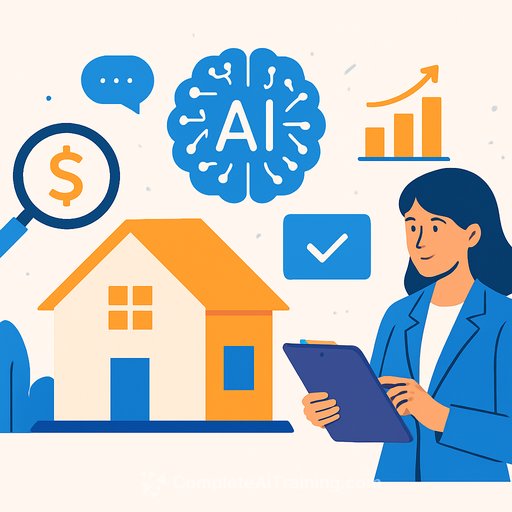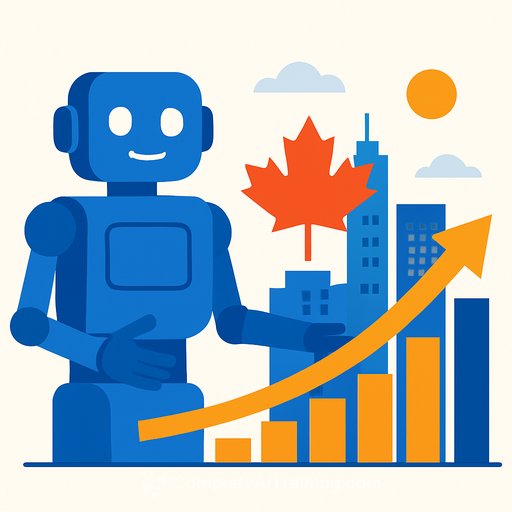Will AI Take My Job? 2025 Reality Check for Real Estate & Construction (U.S. Data)
Short answer: parts of your job, yes. Your whole job, probably not. The data shows AI is more like a strong assistant than a replacement, especially for crews, estimators, supers, property managers, and brokers who deal with messy reality and human decisions.
Across the U.S., roughly 30% of jobs contain tasks current AI can automate or assist. In practice, most roles keep the human in the loop. The win goes to teams that offload busywork and use AI to move faster on bids, schedules, safety, and client updates.
Where exposure is highest
Southern and Midwestern manufacturing corridors show higher automation risk in repetitive workflows. Tech-heavy regions in the Pacific Northwest and Northeast see growth in AI-driven jobs and vendors you can tap for tools and talent.
For real estate and construction, exposure is moderate (~22%). The pressure lands on paperwork, forecasting, and standard comparisons, while demand rises for BIM/VDC, energy-efficiency, site robotics coordination, and skilled trades like electricians, HVAC, and solar.
How AI is changing work on jobsites and in portfolios
- Latest trend: AI for lease analysis, schedule and cost estimation, computer vision for site safety, and property-ops dashboards.
- Tasks most affected: lease abstracting, standard reporting, bid comparisons, RFI/CO paperwork.
- Rising roles: BIM/VDC specialists, energy-efficiency techs, site robotics coordinators, electricians/HVAC/solar.
Job risk snapshot (what shifts first)
- Higher exposure tasks: templated lease abstracts, OCR document pulls, CO/RFI drafting, routine progress reports, simple takeoffs from clean plans.
- Moderate exposure tasks: schedule baselines, cost estimate benchmarking, materials routing, punchlist tracking.
- Lower exposure / growth: field coordination, complex negotiations, client trust work, code interpretation, site leadership, trades requiring hands-on skill.
90-day playbook for crews and firms
- Pick one workflow with measurable pain: RFI/CO paperwork, schedule updates, safety observations, or lease abstracting.
- Standardize inputs (file names, templates, data fields). Good data makes AI useful.
- Pilot a tool that fits your stack: document AI for submittals/leases, comp-automation for bids, computer vision for PPE/fall-risk, LLM drafts for reports and client emails.
- Set guardrails: who reviews outputs, where data is stored, what gets redacted.
- Train the team: 30-60 minutes on prompts, approval checklists, and failure cases.
- Measure cycle time saved, rework rate, and accuracy. Keep what works, cut what doesn't.
Prompts that actually save time
- RFI/CO drafts: "Summarize the issue from the attached plan and spec sections, list missing details, propose two options with cost/time impacts, and flag code items."
- Bid comparisons: "Create a side-by-side comparison of these bids. Highlight scope gaps, exclusions, and likely change orders."
- Lease abstracts: "Extract key terms (rent, escalations, TI, options, maintenance, termination). Return in JSON and a one-page summary."
- Safety notes: "From today's photos and notes, list hazards by priority, location, trade, and corrective action. Add a short briefing for toolbox talk."
Estimator and PM edge
- Estimators: pre-fill quantity ranges from plans, benchmark costs against past jobs, and generate risk registers. You still validate and price nuance.
- PMs/Supers: use AI to draft daily reports, forecast delays from schedule diffs, and prep client updates with clear next steps.
- Owners/Asset managers: run quick NOI scenarios, pull consistent lease terms, and monitor ops KPIs in a simple dashboard.
Career moves that age well
- BIM/VDC fluency: clash detection, 4D/5D links to schedule and cost, model-to-field workflows.
- Energy and codes: efficiency retrofits, electrification, IRA incentives, permitting strategy.
- Data literacy: spreadsheets, SQL basics, and clean project archives for reuse.
- Field leadership: coordination, safety, and client communication. Trust still wins contracts.
- Portfolio proof: keep before/after snapshots of time saved, RFIs avoided, and dollars protected.
Sector comparison at a glance
- Higher exposure: Manufacturing & Logistics (~34-38%), Consumer & Retail (~35%).
- Moderate-High: Media/Marketing/Customer Ops (~32%), Financial Services (~28%).
- Moderate: Real Estate, Construction & Trades (~22%).
- Lower-Moderate: Technology & Cybersecurity (~15%), Healthcare & Life Sciences (~18%), Education (~12%).
FAQ: "Will AI take my job?"
- Is site work safe? Hands-on trades, field coordination, and code interpretation remain human-led. AI helps with planning and documentation.
- Which roles grow? BIM/VDC, energy-efficiency, robotics/site coordination, electricians/HVAC/solar. These pay well and are hard to outsource.
- What should I learn first? Prompting for documents and schedules, basic data cleaning, and one tool for your core workflow.
Sources and further reading
- U.S. Bureau of Labor Statistics - Occupational Outlook Handbook
- World Economic Forum - Future of Jobs Report
Also see Brookings (place-based exposure) and McKinsey sector briefs for 2024-2025 trend details. Figures vary by firm size and tooling; confirm role-level demand and pay with the BLS.
Learn AI skills by job
If you want short, practical courses by role, check these:
Bottom line: Treat AI like a junior teammate. Give it the paperwork and pattern-matching. Keep the judgment, coordination, and client trust. That's how you protect your role and grow your income in 2025.
Last updated on November 1, 2025
Your membership also unlocks:






